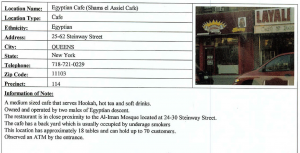Your Obligatory Fran Fragos Townsend Leak
Remember how the detail that UndieBomb 2.0 involved a Saudi infiltrator got out? John Brennan had a private teleconference with Richard Clarke and Fran Fragos Townsend and implied as much, which led to Clarke reporting it (and not long after, ABC confirming it with foreign sources).
At about 5:45 p.m. EDT on Monday, May 7, just before the evening newscasts, John Brennan, President Barack Obama’s top White House adviser on counter-terrorism, held a small, private teleconference to brief former counter-terrorism advisers who have become frequent commentators on TV news shows.
According to five people familiar with the call, Brennan stressed that the plot was never a threat to the U.S. public or air safety because Washington had “inside control” over it.
Brennan’s comment appears unintentionally to have helped lead to disclosure of the secret at the heart of a joint U.S.-British-Saudi undercover counter-terrorism operation.
A few minutes after Brennan’s teleconference, on ABC’s World News Tonight, Richard Clarke, former chief of counter-terrorism in the Clinton White House and a participant on the Brennan call, said the underwear bomb plot “never came close because they had insider information, insider control.”
Now, National Security Council Spokesperson Tommy Vietor, who aggressively but rather unconvincingly tried to claim that the Administration had never intended to publicly announce UndieBomb 2.0, is claiming that the Administration is obligated to hold such teleconferences because the Administration is obligated to be “transparent” about potential threats.
The Yemen plot had many intelligence and national security officials flummoxed and angered by its public airing. Despite that, a senior administration official then briefed network counterterrorism analysts, including CNN’s Frances Townsend, about parts of the operation.
But such briefings are an “obligation” for the administration once a story like the Yemen plot is publicized, insisted National Security Council spokesman Tommy Vietor.
“The reason that we brief former counterterrorism officials is because they are extremely conscientious about working with us about what can and cannot be said or disclosed,” Vietor told Security Clearance. “They understand that there is an obligation for the U.S. to be transparent with American people about potential threats but will work with us to protect operational equities because they’ve walked in our shoes.”
This is the Administration that appears to have just fired a guy for revealing that the bankster threat is growing while the terrorist threat is diminishing, claiming they had to hold a teleconference with TV commentators just before prime time to make sure Americans regarded a Saudi-managed plot as a real threat.
Vietor’s in trouble. Presumably on his advice, the White House was prepping a big roll out of UndieBomb 2.0 the day after this call with Townsend and Clarke. Clearly, by going ahead with the teleconference, he was trying to get maximum spin value out of the plot, after the AP had broken it. Indeed, the detail that led Clarke to learn the “plot” was really a sting–that we (or our buddies the Saudis) were in control the whole time–is precisely the same spin that Brennan’s sanctioned leaks have pushed in the Kill List and StuxNet stories.
But for a variety of reasons, it has become politically costly to admit the White House had planned to spin this. And so, Tommy Vietor keeps trying to tell new stories, hoping one will hold together.

